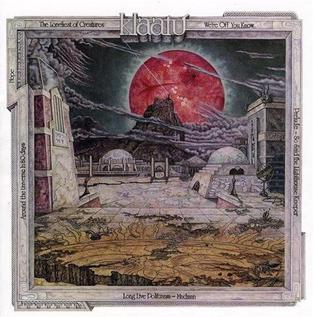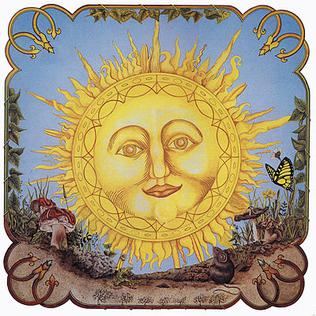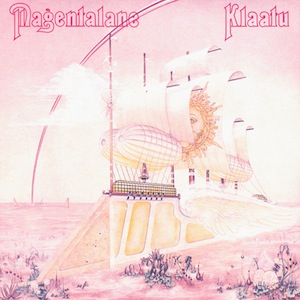
"Beatlesque" or "Beatles-esque" describes a musical resemblance to the English rock band the Beatles. The term is loosely defined and has been applied inconsistently to a wide variety of disparate artists.

Klaatu was a Canadian rock group formed in 1973 by the duo of John Woloschuk and Dee Long. They named themselves after an ambassador, Klaatu, from an extraterrestrial confederation who visits Earth with his companion robot Gort in the film The Day the Earth Stood Still. After recording two non-charting singles, the band added drummer Terry Draper to the line-up; this trio constituted Klaatu throughout the rest of the band's recording career.

Saturday Night Fever is the soundtrack album from the 1977 film Saturday Night Fever starring John Travolta. The soundtrack was released on November 15, 1977 by RSO Records. Prior to the release of Thriller by Michael Jackson, Saturday Night Fever was the best-selling album in music history, and still ranks among the best-selling soundtrack albums worldwide, with sales figures of over 40 million copies.

The Knack was an American rock band based in Los Angeles that rose to fame with its first single, "My Sharona", an international number-one hit in 1979.
Trapeze were an English rock band from Cannock, Staffordshire. Formed in 1969, the band originally featured former The Montanas members John Jones and Terry Rowley (keyboards), and former Finders Keepers members Glenn Hughes, Mel Galley and Dave Holland (drums). Jones and Rowley left the band following the release of their self-titled debut album in 1970, with the lineup of Hughes, Galley and Holland continuing as a trio. After the release of Medusa later in 1970 and You Are the Music... We're Just the Band in 1972, Hughes left Trapeze in 1973 to join Deep Purple.

Hope is the second album by the Canadian rock band Klaatu and their first concept album. Released in September 1977, it won a Juno Award for "Best Engineered Album" and a Canadian Music Critics award for "Best Album" that same year. The album follows the loose concept of space travelers visiting a distant planet.

3:47 EST is the debut album by the Canadian progressive rock group Klaatu, released in August 1976. The album was renamed Klaatu when released in the United States by Capitol Records. The album is notable for its Beatlesque psychedelia. The Juno-nominated album cover was painted by a friend of Klaatu's members, a Canadian graphic artist, Ted Jones.
"Sub-Rosa Subway" is a song written by the Canadian rock band Klaatu, from their album 3:47 EST, describing the efforts of Alfred Ely Beach to create the Beach Pneumatic Transit, the New York City Subway's precursor. His work is described as secretive. The song peaked at No. 62 on the Billboard Hot 100 chart in 1977.

"Calling Occupants of Interplanetary Craft" is a song by Canadian rock band Klaatu, originally released in 1976 on their first album 3:47 EST. The song was played to open night-time transmission of the pirate radio station Radio Caroline. The year following its release, American soft rock duo the Carpenters covered the song, using a crew of 160 musicians. The Carpenters' version reached the top 10 in the UK and Canada, and charted at number 1 in Ireland.

Wild Cherry was an American funk rock band formed in Mingo Junction, Ohio, in 1970 that was best known for its song "Play That Funky Music".

Sun Set is a box set of various Klaatu rarities, outtakes, demos, live tracks and other recordings from 1973 to 1981. It was launched at the "KlaatuKon" 2005 convention in Toronto, Ontario, Canada. The final nine tracks on disc one are alternate versions of Klaatu's second album project, Hope. Referred to as "The Orchestral Hope", this included a track not present on the version of Hope which was originally released; "Epilogue," which joined "So Said the Lighthouse Keeper" and "Hope".

Endangered Species is the fourth and penultimate album by the Canadian rock band Klaatu, released in 1980.

Magentalane was the fifth and final album of new material by the Canadian rock group Klaatu.

Yellow Magic Orchestra is the first official studio album by Japanese electronic music band Yellow Magic Orchestra, who were previously known as the Yellow Magic Band. Originally released by Alfa Records, in Japan in 1978, the album was released by A&M Records in Europe and the United States and Canada in early 1979, with the US version featuring new cover art but without the closing track of "Acrobat". Both versions would later be re-issued in 2003 as a double-disc format, with the American version as the first disc.

Crossroads is a 1988 music collection box set of the work of Eric Clapton released by Polydor Records. The set includes his work with the Yardbirds, John Mayall & the Bluesbreakers, Cream, Blind Faith, Delaney & Bonnie & Friends and Derek and the Dominos, as well as his solo career.

Spirits Having Flown is the fifteenth album by the Bee Gees, released in 1979 by RSO Records. It was the group's first album after their collaboration on the Saturday Night Fever soundtrack. The album's first three tracks were released as singles and all reached No. 1 in the US, giving the Bee Gees an unbroken run of six US chart-toppers in a one-year period and equaling a feat shared by Bing Crosby, Elvis Presley, and The Beatles. It was the first Bee Gees album to make the UK top 40 in ten years, as well as being their first and only UK No. 1 album. Spirits Having Flown also topped the charts in Australia, Canada, Germany, New Zealand, Sweden and the US. The album has sold more than 20 million copies worldwide.
Terry Edward Draper is a Canadian musician who was the drummer and one of three songwriters for the 1970s progressive rock band Klaatu.

The Wings Over the World tour was a series of concerts in 1975 and 1976 by the British–American rock band Wings performed in Britain, Australia, Europe, the United States and Canada. The North American leg constituted band leader Paul McCartney's first live performances there since the Beatles' final tour, in 1966, and the only time Wings would perform live in the US and Canada. The world tour was well-attended and critically acclaimed, and resulted in a triple live album, Wings over America, which Capitol Records released in December 1976. In addition, the tour was documented in the television film Wings Over the World (1979) and a cinema release, Rockshow (1980).
"Little Neutrino" is a track written by Dee Long, from the album 3:47 EST by the progressive rock group Klaatu.

The Wild Places is the third studio album by English singer-songwriter and musician Duncan Browne. Released in 1978 through Logo and Sire Records, it is Browne's first solo album since his departure from the band Metro that year, and features contributions from session musicians Tony Hymas, John Giblin and Simon Phillips. In contrast to his previous self-titled solo record, the sound of the album is fully electric and ranges from progressive rock to straightforward rock music and synthpop.
















